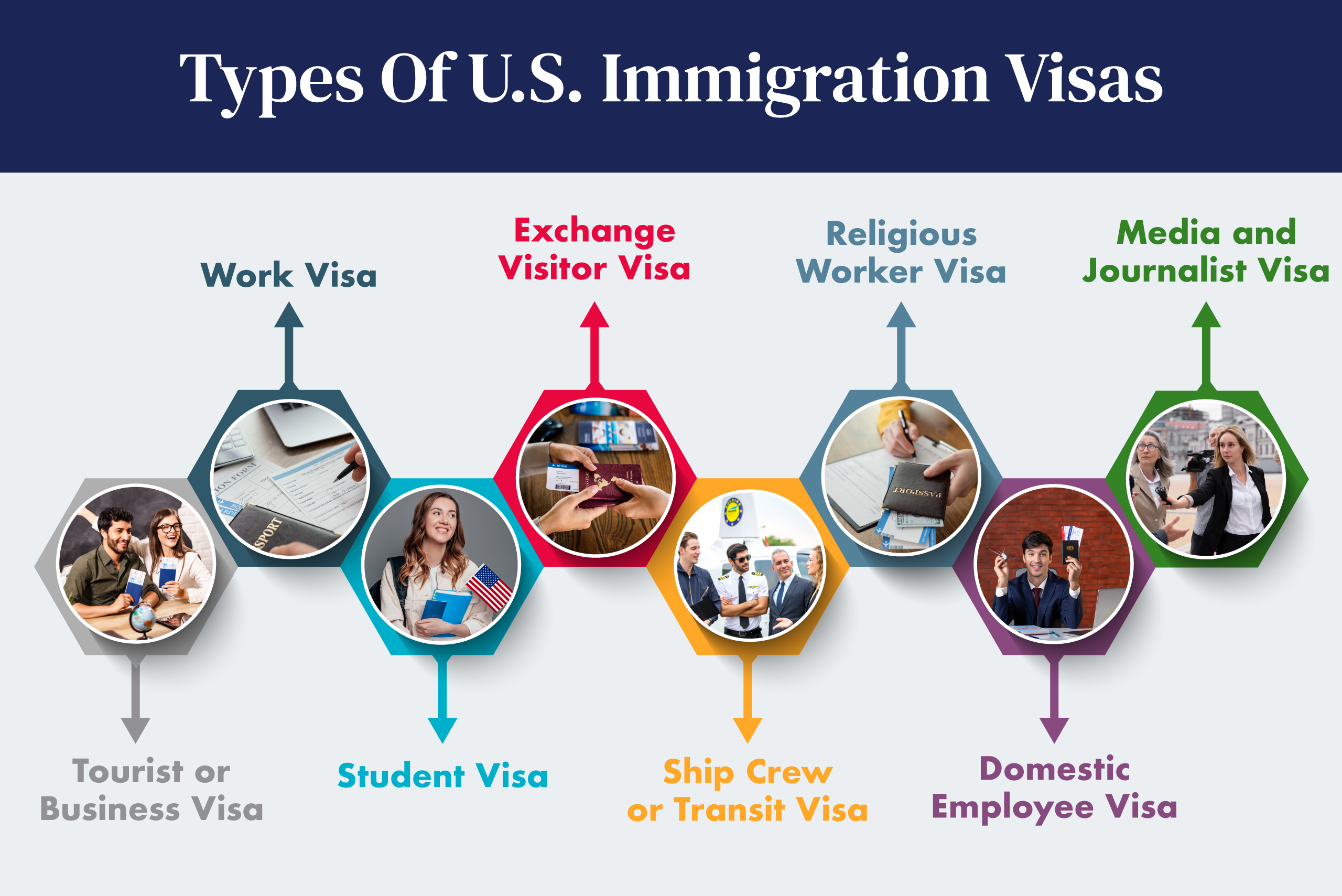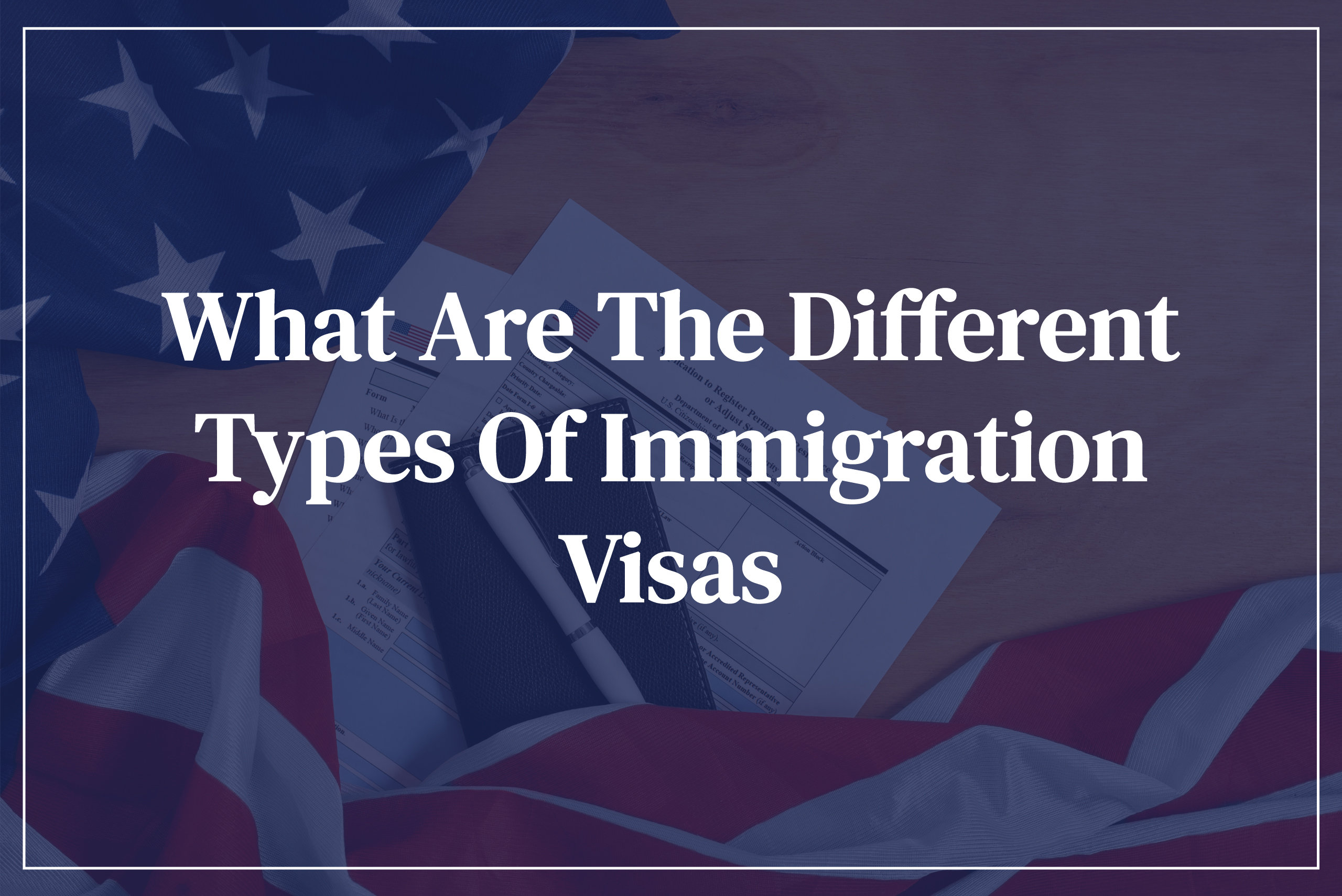Immigration visas, often referred to as immigrant visas or permanent residency visas, are documents that allow individuals to move to and live in a foreign country with the intention of becoming permanent residents or citizens. These visas typically grant the holder the right to live, work, and study in the host country for an extended period, with the possibility of eventually applying for citizenship. The specific types of immigration visas vary from country to country, but they generally fall into several categories:

The most common types of U.S. Visa are as follows:
Tourist or Business Visa
There are two types of Visas offered – tourist or business Visas. Most often, the two types are merged and issued as one Visa. You must prove to the consular officer that the stay in the U.S. is temporary, and you must show proof of funds to cover your expenses while in the U.S. Proof of living outside the U.S. must also be shown. You cannot accept a job offer under this Visa.
B-1 visas are for business associates, scientific, educational, or business convention attendees, and those settling an estate or negotiating contracts.
B-2 visas are issued for various purposes, including tourism, visiting friends and family, medical treatment, and social or service activities.
Work Visa: You require a certain Visa depending on the kind of work you will do to work temporarily in the U.S. In order to qualify for H, L, O, P, and Q, applicants must have their petition accepted by USCIS. Before submitting a request for a work visa at the Consulate, Form I-129 must be approved. The employer will then get Form I-797, which serves as a notification that your petition has been approved. You must bring both Form I-129 and Form I-797 to your Consulate interview. Visas offered for work are as follows:
- H1-B for Specialty occupation: You must have at least a Bachelor’s degree in a particular specialty to be eligible for an H1-B visa. USCIS will decide if your work qualifies as a specialized occupation and whether you are qualified to provide the requested service. The employer is required to submit a Labor Condition Application to the Department of Labor as part of your employment contract terms and conditions.
- H-1 B-1 – Work Visa on a Temporary Basis: Singaporean and Chilean citizens can temporarily apply for a Visa to work in the U.S. However, individuals must already have a job offer in the U.S. before applying for the Visa.
- H-2A for Seasonal agricultural workers: A temporary agricultural Visa, or H-2A Visa, is available to U.S. employers who need to fill seasonal agricultural jobs but need help finding qualified U.S. workers. In order to apply for this Visa, the employer must file a Form I-129 petition on behalf of the foreign national.
- H-2B for skilled and unskilled workers: This type of Visa is given to foreign nationals who will fill temporary or seasonal jobs in the U.S. and face a shortage of U.S. workers.
- H-3 for trainees: If you are reaching the U.S. to acquire training in any domain from an employer for up to two years, you must obtain this requirement. You are permitted to receive payment for the training. However, it should not be utilized for productive employment purposes.
- H-4 for dependents: If you hold a valid H Visa, your spouse, and unmarried children under 21 can get an H-4 Visa to come with you to the U.S. However, your spouse and children with this Visa are not authorized to work in the U.S.
- L-1 for intra-company transferees: This Visa is required if you are an employee of an international company and are being transferred on a temporary basis to the parent branch, an affiliate, or a subsidiary of the company. To qualify for an L-1 visa, you must have worked for a subsidiary, branch, affiliate, or parent of the U.S. company outside the U.S. for at least one year within the past three years and be arriving in the U.S. to work in a managerial or executive position or have specialized knowledge about the business or its functions. You must have been employed continuously for one year with the international company within three years preceding the application for admission to the U.S.
- L-2 for dependents: If you possess a valid L visa, your spouse and unmarried children under 21 may apply for an L-2 visa to enter the United States. If your partner wants to work in the U.S., they must fill out and submit Form I-765 and the application fee. Please note that your children will not be eligible to work in the United States.
- Type O Visa: This Visa is available for individuals with exceptional ability in fields such as science, education, arts, business, and athletics, as well as motion picture and television production.
- Type P Visa: This Visa is intended for foreign athletes, entertainers, and support personnel who come to perform in the United States.
- Type Q Visa: This Visa is required if you are traveling to participate in an international cultural exchange program in the U.S. to provide training, employment, and share the history, culture, and traditions of your home country. The sponsor must file the petition, which is to be approved by USCIS.
- Student Visa
Foreign nationals who travel to the United States to pursue higher education must be admitted by the institution or program. After being accepted, they will receive the relevant approval documents to provide when applying for the student visa. The students have 120 days from the I-20’s commencement date to apply for a visa and 30 days from that date to travel. Visas offered for students are:
- F-1 Visa: This Visa is given to people who want to enroll in academic programs at U.S.-approved universities or in programs for learning English. If your course requires more than 18 hours per week, you must have this Visa. Students who are enrolled in a public secondary school are granted this Visa.
- M-1 Visa: The non-academic vocational training Visa is available for those who wish to undergo vocational training or other forms of non-academic training in the United States. Holders of nonimmigrant visas such as A, E, H-4, F-2, G, J-2, L-2, M-2, and others can also enroll in public elementary and secondary schools. Students who leave the U.S. for a period of five months or more may lose their F-1 or M-1 status unless their overseas activities are related to their course.
- Exchange Visitor Visa: Foreign citizens can join the exchange programs in the United States. Before applying for the Visa, you must first be accepted and approved by an authorized program sponsor. The exchange visitor gets a J Visa designed to promote exchanging knowledge and aptitudes in various fields. Participants can be:
- Educators
- Professional trainees
- Professors
- Students at academic levels
- Research Scholars
- Visitors coming for travel, consultation, research purposes, etc.
- Ship Crew or Transit Visa: Below are the two types of visas that are offered for transit or ship crew
- Transit C Visa: This Visa is for foreign citizens traveling through the United States to another country and wishing to visit friends or family during their layover. To be eligible, they must qualify for a B-2 visa.
- Crew D Visa
You may be eligible for a special visa if you are a crew member serving on a sea vessel or aircraft. Typically, crew members use a combination of transit or crew visas (C-1 or D). However, if you are on board a vessel within the Outer Continental Shelf, you may qualify for a modified B-1 visa instead of a crew visa.
If you are a crew member entering the U.S. during time off between flights or cruises, you must obtain B-1 or B-2 visas.
- Religious Worker Visa
R-type Visa is a temporary work visa for those employed in a religious capacity in the U.S. Religious worker includes individuals authorized by a recognized entity to conduct religious activities.
- Domestic Employee Visa
If you are a personal or domestic servant accompanying your employer to the United States, you may be eligible for a B-1 Visa. The category of domestic employees includes those who work for foreign diplomats or government officials, who may be eligible for an A-3 or G-5 Visa.
- Housemaids
- Valets
- Footmen
- Cooks
- Butlers
- Chauffeurs
- Nannies
- Mother’s helpers
- Gardeners
- Paid companions
- Media and Journalist Visa
Media (I) A nonimmigrant who works for a foreign media outlet is given a visa to enter the country temporarily so they can carry out their line of work. However, they are required to have a home office abroad. A visitor’s Visa is offered to foreign citizens if they are traveling for the following purposes:
- Attending a conference or a meeting
- Guest lecture
- Engaging in academic activities
- Purchasing media equipment
- Vacation
Spouses and children under 21 can accompany the principal Visa holder under the B-2 Visa.
It’s important to note that immigration policies and visa availability can change, and the specific requirements and options may vary over time. The process for obtaining an immigration visa for the USA can be complex, and applicants should consult or seek legal advice for the most up-to-date information and guidance on the immigration process by RPatel Law Firm.
RPatel Law Firm – From Struggle to Triumph – Immigration and Personal Injury Attorney Fighting for You.
To many people, migrating is a way to improve different aspects
of their lives. They will find guidance and answers in RPatel Law to help them open that door full of new possibilities.


